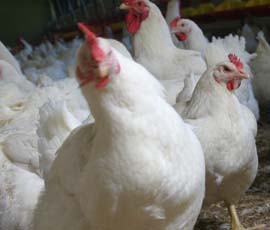Poultry disease gives insights into tumor growth

A research project into the deadly Marek’s Disease, which affects poultry, may have implications for research into how some cancers develop in humans.
The study by The Roslin Institute at University of Edinburgh analysed genes that cause Marek’s disease, pinpointing those that cause the infection, called IRG1, that makes chickens more susceptible to the disease.
Scientists believe the gene causes the death of cells, which can in turn lead to diseases including cancer.
Chickens and humans, have anti-tumour mechanisms, one of which is controlled by a gene called HIC1 which also switches on lots of other genes which have anti-tumour effects.
Marek’s disease switches off those genes controlled by HIC1 which would normally work to block tumours.
Many viruses cause tumours such as the human papilloma virus, which can lead to cervical cancer, and Kaposi’s sarcoma, which affects patients with HIV.
“Marek’s disease is highly contagious and chickens are becoming increasingly resistant to vaccination. Identifying a gene that increases the risk of Marek’s disease could help us breed chickens that are less susceptible to infection,” said Professor Pete Kaiser, of The Roslin Institute.
“Also, learning about how chickens affected by Marek’s disease fail to combat the onset of tumours will help us learn more about how certain viruses can trigger cancer in humans.”
The research was funded by the Biotechnology and Biological Sciences Research Council, is set to be published in the Journal of Virology.
